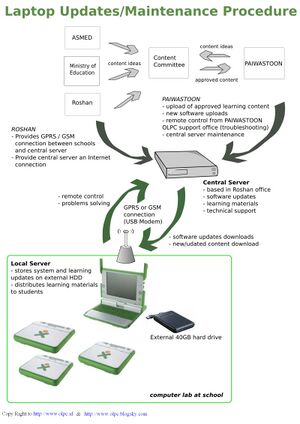OLPC Afghanistan: Difference between revisions
| Line 93: | Line 93: | ||
* [[OLPC Afghanistan/Job descriptions]] - jobs needed for the project, not necessarily filled |
* [[OLPC Afghanistan/Job descriptions]] - jobs needed for the project, not necessarily filled |
||
* [[OLPC Afghanistan Stakeholders]] |
* [[OLPC Afghanistan Stakeholders]] |
||
* [[Technical structure and operations]] |
|||
=== External links === |
=== External links === |
||
Revision as of 20:03, 21 December 2009
One Laptop Per Child AfghanistanThis is the new Official Wiki page for "One Laptop Per Child Afghanistan" project. Project GoalsThe Afghanistan OLPC project will revolutionize the way in which children are taught and promote cooperation between the diverse set of communities existing in central Asia. The goal of OLPC Afghanistan is to provide every child with new opportunities to explore, experiment, and express themselves in a collaborative way. Mission: To create a fit environment for OLPC, take necessary steps to ensure every child in Afghanistan receives an XO laptop and develop the Local Activities for OLPC laptops that could revolutionize how Afghani children are educated. The Ministry of Education Afghanistan (MoE), and Ministry of Communication and Information Technology Afghanistan (MoCIT), in a unique public-private partnership with USAID’s Afghanistan Small and Medium Enterprise Development (ASMED) and Telecom Development Company Afghanistan - Roshan, launched the One Laptop Per Child (OLPC) project in Afghanistan in September 13, 2008. Contacts and Further Information• Official OLPC Afghanistan website • Official OLPC Afghanistan Dari Weblog • Contact Salim Hayran, OLPC Afghanistan Project Coordinator • Send inquiries to info@olpc.af DeploymentsDeployment Wiki PageRead here Information on pilot project, first and second phase of deployment and list of schools selected for implementation. Team Members InvolvedOLPC Afghanistan Team Read More about the OLPC Afghanistan team and volunteers [here] Media Coverage4/3/09 Huffington Post: “Afghanis Desperately want to Learn and aren't Afraid to Do So: Washington can't be Afraid to Help Them” by Matt Keller, Director of Europe, Middle East and Africa for One Laptop per Child. 3/5/09 CNN: “Laptops bring lessons, maybe even peace” 2/10/09 USAID: “One Laptop per Child Program to be Launched in Afghanistan” 1/31/09 USAID: “One Laptop Per Child program launched in Afghanistan” 9/9/08 Tech World: “How the OLPC can help beat Taliban in Afghanistan” 9/5/08 PC World: “OLPC Seeks ITU's Help to Promote Laptops” 12/12/07 CSR Wire (The Corporate Social Responsibility Newswire): “The Kite Runner Inspires Gift Through One Laptop” Picture Blog Technical structure and operationsThe first diagram shows the structure of Technical operations of OLPC Afghanistan. The Second one is the chart of Laptop Update and Maintenance procedure and the job of each team member. The third diagram is showing an example of networking sites available for teachers in schools. Sections: The whole Technical operations can be divided into 5 sections.
This section's responsibility is deployment of OLPC laptops to schools with all related logistics and actions.
Technical trainers are responsible for education of teachers and at the beginning of the project also for education of Technical operations staff.
User service teams provides support for teachers and schools what OLPC laptops concern – troubleshooting, documentation creation, development of new activities (programs). This team will closely cooperate with Ministry of Education on development of new content and activities for OLPC already deployed where MoE will provide the Curricular specifications and content and User service team developers will create the programming part.
Localization team is responsible for translating the current activities into Dari and Pashto. This activity will take place at the very beginning of OPLC project. See also
External links
See the Deployments page for deployment summary information pulled from these pages. Template:Deployment puts pages in this category. Deployment coordinators can use Has default form::Form:Deployment to edit these pages; look for an 'edit with form' tab on them. Afghanistan | ||||||||||||||



